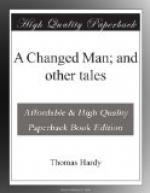He requests me now to open the lantern, which I do, and the light streams out upon the wet sod. At last divining his proceedings I say that I had no idea, in keeping the tryst, that he was going to do more at such an unusual time than meet me for a meditative ramble through the stronghold. I ask him why, having a practicable object, he should have minded interruptions and not have chosen the day? He informs me, quietly pointing to his spade, that it was because his purpose is to dig, then signifying with a grim nod the gaunt notice-post against the sky beyond. I inquire why, as a professed and well-known antiquary with capital letters at the tail of his name, he did not obtain the necessary authority, considering the stringent penalties for this sort of thing; and he chuckles fiercely again with suppressed delight, and says, ‘Because they wouldn’t have given it!’
He at once begins cutting up the sod, and, as he takes the pickaxe to follow on with, assures me that, penalty or no penalty, honest men or marauders, he is sure of one thing, that we shall not be disturbed at our work till after dawn.
I remember to have heard of men who, in their enthusiasm for some special science, art, or hobby, have quite lost the moral sense which would restrain them from indulging it illegitimately; and I conjecture that here, at last, is an instance of such an one. He probably guesses the way my thoughts travel, for he stands up and solemnly asserts that he has a distinctly justifiable intention in this matter; namely, to uncover, to search, to verify a theory or displace it, and to cover up again. He means to take away nothing—not a grain of sand. In this he says he sees no such monstrous sin. I inquire if this is really a promise to me? He repeats that it is a promise, and resumes digging. My contribution to the labour is that of directing the light constantly upon the hole. When he has reached something more than a foot deep he digs more cautiously, saying that, be it much or little there, it will not lie far below the surface; such things never are deep. A few minutes later the point of the pickaxe clicks upon a stony substance. He draws the implement out as feelingly as if it had entered a man’s body. Taking up the spade he shovels with care, and a surface, level as an altar, is presently disclosed. His eyes flash anew; he pulls handfuls of grass and mops the surface clean, finally rubbing it with his handkerchief. Grasping the lantern from my hand he holds it close to the ground, when the rays reveal a complete mosaic—a pavement of minute tesserae of many colours, of intricate pattern, a work of much art, of much time, and of much industry. He exclaims in a shout that he knew it always—that it is not a Celtic stronghold exclusively, but also a Roman; the former people having probably contributed little more than the original framework which the latter took and adapted till it became the present imposing structure.




